DeFi
ETFSwap (ETFS) Vs. Ethereum (ETH) Vs. Solana (SOL): Which Platform is Leading The DeFi Revolution?
Published
4 months agoon
By
admin
The DeFi space is rapidly evolving, with several key players vying for dominance. ETFSwap (ETFS) enters the fray, challenging established giants like Ethereum and Solana. As these platforms battle for supremacy, it’s becoming clear that ETFSwap (ETFS) is emerging as a formidable contender, leveraging cutting-edge utilities and super crypto technology to stake its claim at the forefront of the DeFi revolution.
ETFSwap (ETFS): A New DeFi Powerhouse In the Crypto ETF Market
ETFSwap (ETFS) is rapidly becoming a force to be reckoned with in the DeFi space, especially in the thriving crypto ETF market. This DeFi project is a comprehensive ecosystem designed to revolutionize how traders and investors engage with crypto ETFs. ETFSwap’s (ETFS) advanced technology includes a decentralized trading infrastructure, AI-powered ETF trading tools like the ETF Tracker and the ETF Screener, and ultra-fast transactions, all designed to enhance user experience and profitability.
ETFSwap (ETFS) shines with its innovative crypto ETF platform, allowing users to invest in tokenized traditional ETFs—merging traditional finance with blockchain. Its powerful ETF search and ETF filter tools simplify informed decision-making, while the staking feature boasts a remarkable 87% APR, drawing investors seeking high returns. Yield farming and a community governance model keep the platform decentralized and user-driven.
Backed by a flawless Cyberscope audit and SolidProof’s KYC verification, ETFSwap (ETFS) offers top-tier security and transparency, making it one of the most reliable platforms in DeFi. Riding on Ethereum’s robust blockchain, ETFSwap (ETFS) not only matches established players but also introduces new innovations that set it apart as a DeFi leader.
Ethereum: The Original DeFi Leader Facing New Competition
Ethereum currently holding out at $2,543.92 has long been the gold standard in the DeFi space, serving as the foundational layer for countless decentralized applications (dApps) and protocols. Its smart contract functionality revolutionized the crypto world, enabling the creation of DeFi projects that operate without intermediaries. Ethereum’s role in popularizing DeFi cannot be overstated, with projects like Uniswap, Aave, and Compound all built on its blockchain.
However, despite its dominance, Ethereum is facing challenges that could impact its leadership in the DeFi space. The network’s well-known scalability issues have led to high gas fees and slower transaction times, frustrating users and developers alike. Ethereum 2.0 promises to address these issues with the transition to a proof-of-stake consensus mechanism, but the full upgrade is still in progress, leaving the door open for competitors like ETFSwap (ETFS) to make their mark.
In this context, ETFSwap (ETFS) is emerging as a strong competitor. By leveraging Ethereum’s strengths and adding its own innovations, ETFSwap (ETFS) offers users a faster, more cost-effective alternative that retains the security and reliability of Ethereum. While Ethereum remains a powerhouse in the DeFi world, ETFSwap’s advanced utilities and user-friendly platform are making it increasingly difficult for Ethereum to maintain its dominance unchallenged.
Solana: A High-Speed Challenger With Limitations
Solana currently trading at $134.75 has made headlines as one of the fastest blockchains in the crypto space, boasting impressive transaction speeds and low fees.
These attributes have made Solana (SOL) a favorite for DeFi developers looking to build high-performance dApps. Solana’s (SOL) ecosystem has grown rapidly, with projects like Serum and Raydium demonstrating the platform’s potential to support complex DeFi applications.
Solana’s (SOL) rapid growth is marred by network outages and less decentralization compared to Ethereum (ETH), raising concerns about its reliability. In contrast, ETFSwap (ETFS) combines Ethereum’s robust blockchain with high-speed, AI-driven tools, offering superior reliability, security, and performance. While Solana’s DeFi stance is strong, ETFSwap (ETFS) presents a more compelling choice for investors seeking a platform poised to lead the DeFi revolution.
Conclusion: ETFSwap (ETFS)—The New King Of DeFi
In the race for DeFi dominance, ETFSwap (ETFS) is pulling ahead, outpacing Ethereum and Solana (SOL) with its innovative features and cutting-edge technology. Don’t miss your chance—invest in ETFSwap (ETFS) today at just $0.03846 before the presale ends, and secure your place in the future of DeFi and crypto ETF trading.
For more information about the ETFS Presale:
The post ETFSwap (ETFS) Vs. Ethereum (ETH) Vs. Solana (SOL): Which Platform is Leading The DeFi Revolution? first appeared on BTC Wires.
Source link
You may like


Experts say these 3 altcoins will rally 3,000% soon, and XRP isn’t one of them


Robert Kiyosaki Hints At Economic Depression Ahead, What It Means For BTC?


BNB Steadies Above Support: Will Bullish Momentum Return?


Metaplanet makes largest Bitcoin bet, acquires nearly 620 BTC
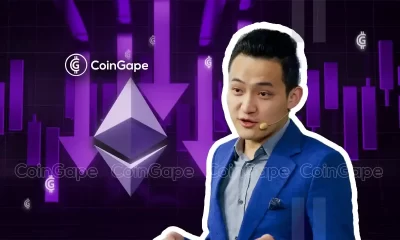

Tron’s Justin Sun Offloads 50% ETH Holdings, Ethereum Price Crash Imminent?


Investors bet on this $0.0013 token destined to leave Cardano and Shiba Inu behind
DeFi
DeFi Protocol Usual’s Surge Catapults Hashnote’s Tokenized Treasury Over BlackRock’s BUIDL
Published
16 hours agoon
December 22, 2024By
admin
There’s been a change of guard at the rankings of the $3.4 billion tokenized Treasuries market.
Asset manager Hashnote’s USYC token zoomed over $1.2 billion in market capitalization, growing five-fold in size over the past three months, rwa.xyz data shows. It has toppled the $450 million BUIDL, issued by asset management behemoth BlackRock and tokenization firm Securitize, which was the largest product by size since April.

USYC is the token representation of the Hashnote International Short Duration Yield Fund, which, according to the company’s website, invests in reverse repo agreements on U.S. government-backed securities and Treasury bills held in custody at the Bank of New York Mellon.
Hashnote’s quick growth underscores the importance of interconnecting tokenized products with decentralized finance (DeFi) applications and presenting their tokens available as building blocks for other products — or composability, in crypto lingo — to scale and reach broader adoption. It also showcases crypto investors’ appetite for yield-generating stablecoins, which are increasingly backed by tokenized products.
USYC, for example, has greatly benefited from the rapid ascent of the budding decentralized finance (DeFi) protocol Usual and its real-world asset-backed, yield-generating stablecoin, USD0.
Usual is pursuing the market share of centralized stablecoins like Tether’s USDT and Circle’s USDC by redistributing a portion of revenues from its stablecoin’s backing assets to holders. USD0 is primarily backed by USYC currently, but the protocol aims to add more RWAs to reserves in the future. It has recently announced the addition of Ethena’s USDtb stablecoin, which is built on top of BUIDL.
“The bull market triggered a massive inflow into stablecoins, yet the core issue with the largest stablecoins remains: they lack rewards for end users and do not give access to the yield they generate,” said David Shuttleworth, partner at Anagram. “Moreover, users do not get access to the protocol’s equity by holding USDT or USDC.”
“Usual’s appeal is that it redistributes the yield along with ownership in the protocol back to users,” he added.

The protocol, and hence its USD0 stablecoin, has raked in $1.3 billion over the past few months as crypto investors chased on-chain yield opportunities. Another significant catalyst of growth was the protocol’s governance token (USUAL) airdrop and exchange listing on Wednesday. USUAL started trading on Binance on Wednesday, and vastly outperformed the shaky broader crypto market, appreciating some 50% since then, per CoinGecko data.
BlackRock’s BUIDL also enjoyed rapid growth earlier this year, driven by DeFi platform Ondo Finance making the token the key reserve asset of its own yield-earning product, the Ondo Short-Term US Government Treasuries (OUSG) token.
Source link
Aave
AAVE Dominates DeFi Lending – Metrics Reveal 45% Market Share
Published
1 week agoon
December 15, 2024By
admin
Aave (AAVE), the leading decentralized finance (DeFi) lending protocol, has captured the spotlight with an extraordinary surge of over 200% since November 5. Outperforming the broader market, AAVE has reached its highest levels since 2021, marking a remarkable recovery and reaffirming its dominance in the DeFi ecosystem.
Related Reading
Key metrics from IntoTheBlock underscore AAVE’s unmatched position in the lending sector. With an impressive 45% market share, it remains the top choice for users seeking decentralized borrowing and lending solutions.
With AAVE trading at multi-year highs and on-chain data suggesting robust activity, the altcoin’s trajectory remains a focal point for investors and analysts alike. The question is whether the price can sustain this momentum and reach new all-time highs in the coming months.
AAVE Keeps Growing
Aave (AAVE) has shown consistent growth over the past year, solidifying its position as a market leader in the DeFi lending sector. Known for its innovative approach to creating non-custodial liquidity markets, Aave enables users to earn interest on supplied and borrowed assets at variable interest rates. This approach has made Aave a go-to protocol for decentralized borrowing and lending.
For years, Aave has been at the forefront of DeFi innovation, continually enhancing its platform and user experience. Its success is evident in its market dominance. Metrics from IntoTheBlock highlight Aave’s unrivaled leadership, boasting an impressive 45% market share in the DeFi lending space.
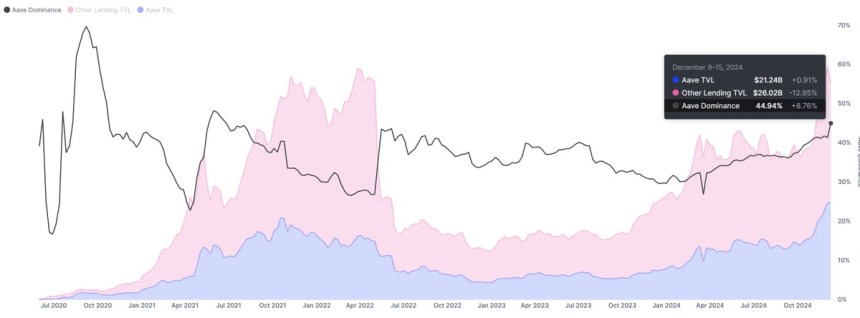
This dominance is further emphasized by Aave’s staggering total value locked (TVL), which stands at $21.2 billion—almost equal to the combined TVL of all other lending protocols.
Related Reading
Such figures underline Aave’s critical role in the DeFi ecosystem. Its established presence and robust infrastructure position it as a key player in the event of a broader DeFi resurgence. Should the sector heat up in the coming weeks, Aave is likely to attract significant attention from investors and traders.
Price Targets Fresh Supply Levels
Aave (AAVE) is currently trading at $366, following a surge to a multi-year high of $396 just hours ago. The altcoin continues its upward momentum as it approaches the critical $420 resistance level, a threshold last held in September 2021. This mark is seen as a pivotal area for AAVE’s next phase of price action, with many analysts expecting a significant reaction once tested.
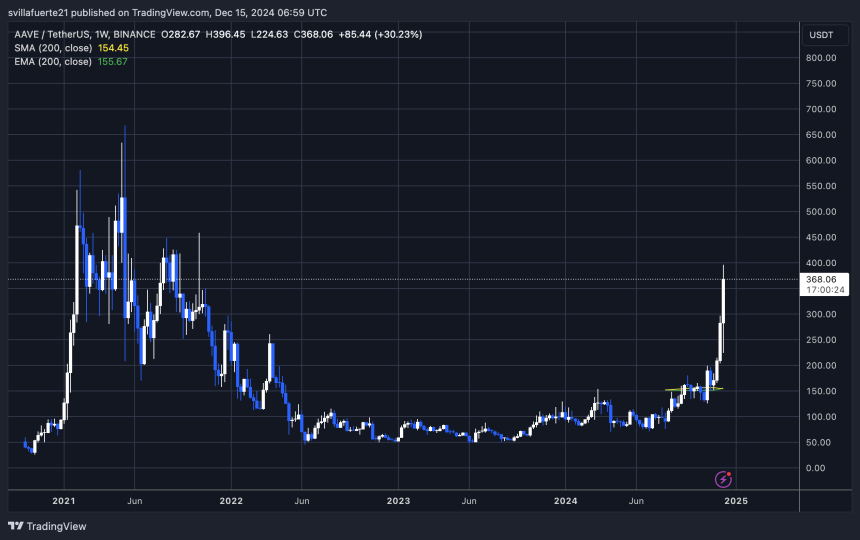
If AAVE manages to hold its current levels and sustain the bullish momentum, the next logical target would be the $420 resistance zone. Breaking above this level could signal a continuation of its multi-month rally, setting the stage for even higher price targets as investor confidence builds.
On the downside, failure to maintain support above the $320–$340 range could lead to a broader correction. A move below this zone might push the price lower, erasing some of its recent gains and dampening bullish sentiment in the short term.
Related Reading
AAVE remains in a strong position for now, but traders are closely monitoring its price action near these key levels. Whether it can sustain its upward trajectory or faces a pullback will depend on its ability to break and hold above significant resistance zones.
Featured image from Dall-E, chart from TradingView
Source link
Blockchain
Dogeson, Shiro Neko, Orbit among Saturday’s largest gainers
Published
1 week agoon
December 15, 2024By
admin
Three coins have risen to the top of the leaderboard: The Dogeson, a playful nod to Elon Musk, his son and Dogecoin; Shiro Neko, a cat-themed token tied to gaming and NFTs; and Orbit, a space-inspired coin.
These tokens topped the gainers’ charts on Saturday night. Here’s a closer look at each.
Dogeson
The Dogeson (DOGESON), a Doge-inspired coin named after an edited photo Elon Musk posted of himself and his son, X Æ A-12, is up more than 90% at last check Saturday.
With a market cap reaching $146.6 million, the token is built on the Ethereum blockchain and has garnered attention for its narrative of a “space-bound Doge” — meshing humor with a decentralized finance (DeFi) theme.
Details about The Dogeson’s founding team or developers were not immediately clear.
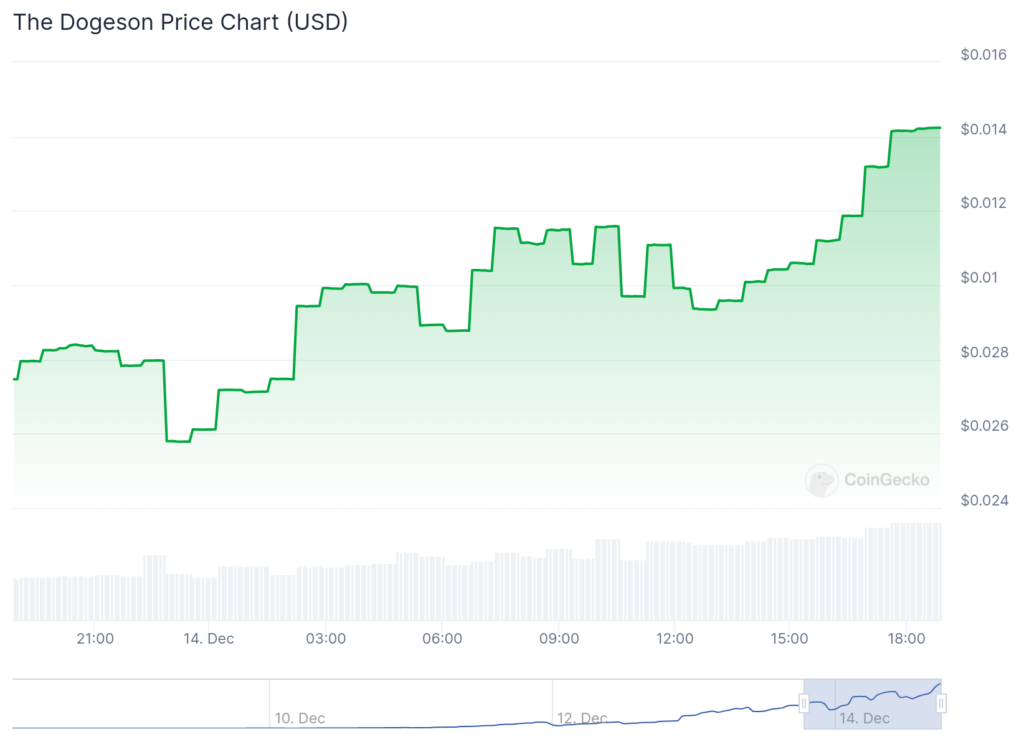
Shiro Neko
Shiro Neko (SHIRO) is a new cryptocurrency project that blends blockchain technology with play-to-earn (P2E) gaming.
Its ecosystem is built around a native token that can be used for in-game purchases, staking, and governance.
It’s up over 83% at last check, with a market cap of about $441 million.
The project emphasizes a community-driven approach, immersive gaming experiences, and collectible in-game assets, including NFTs. It aims to attract both gamers and crypto enthusiasts through competitive challenges and real-world rewards
Shiro Neko is also building on Shibarium, the Layer 2 blockchain for the Shiba Inu ecosystem, further anchoring itself in a popular crypto community. Additionally, the project is venturing into entertainment by launching an animated series featuring “Shiro” the cat.
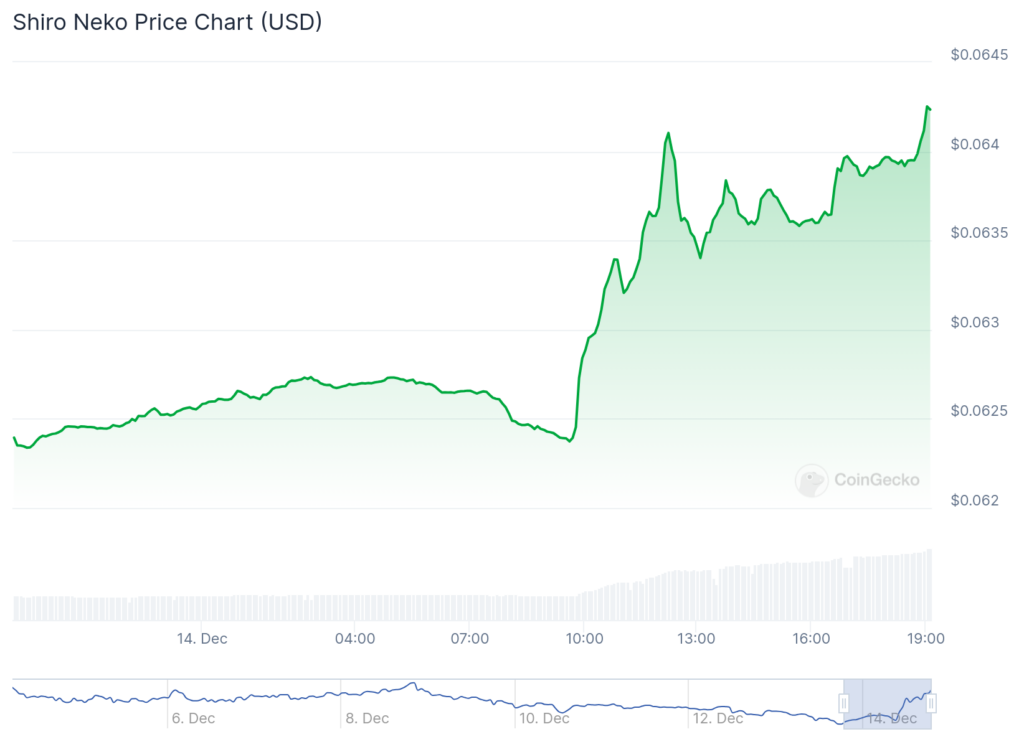
The token recently had its Initial Exchange Offering (IEO) on Gate.io, with 88 billion tokens available for sale, representing 0.01% of its total supply of 1 quadrillion tokens.
This reflects a focus on early adoption and community-building in the crypto-gaming landscape.
Orbit
Orbit (ORBIT) was up 77.6% at last check Saturday, with a market cap of roughly $44 million.
Built on the Blast Chain, the native utility token of the Orbit Protocol serves multiple purposes including facilitating governance, incentivizing participants, and enabling staking for rewards.
The protocol also boasts a Total Value Locked (TVL) of over $6.4 million and a fixed total supply of 100 million.
As of now, ORBIT’s market performance shows significant price fluctuations, with a 24-hour range of $0.02543 and $0.06379.
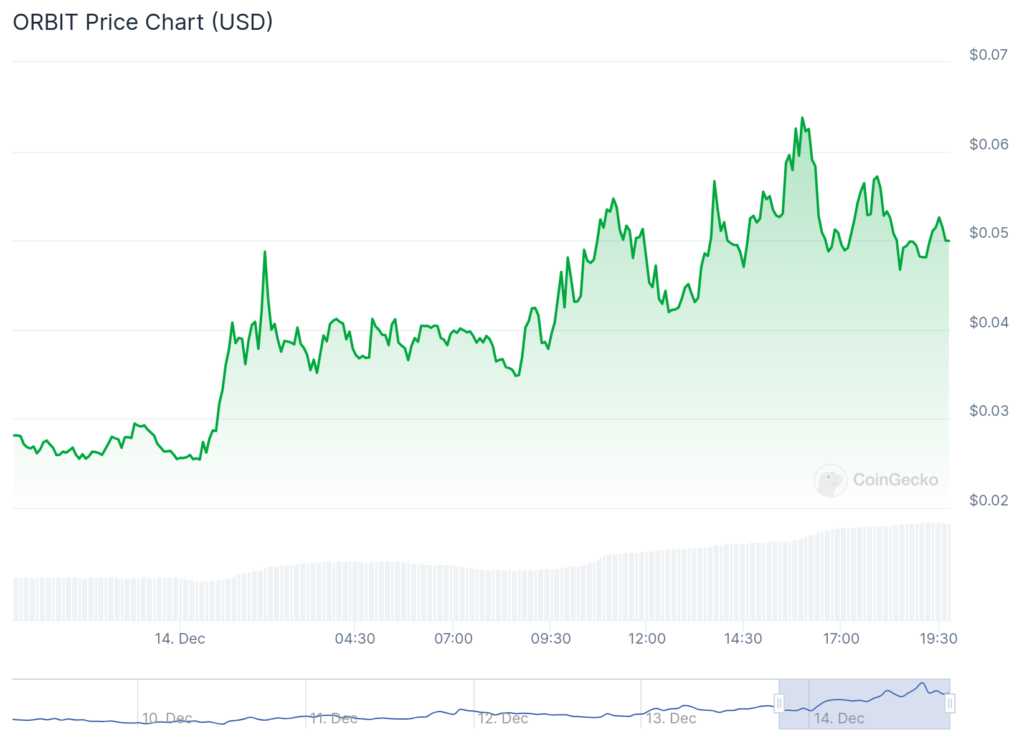
Source link

Experts say these 3 altcoins will rally 3,000% soon, and XRP isn’t one of them

Robert Kiyosaki Hints At Economic Depression Ahead, What It Means For BTC?

BNB Steadies Above Support: Will Bullish Momentum Return?

Metaplanet makes largest Bitcoin bet, acquires nearly 620 BTC

Tron’s Justin Sun Offloads 50% ETH Holdings, Ethereum Price Crash Imminent?

Investors bet on this $0.0013 token destined to leave Cardano and Shiba Inu behind

End of Altcoin Season? Glassnode Co-Founders Warn Alts in Danger of Lagging Behind After Last Week’s Correction

Can Pi Network Price Triple Before 2024 Ends?

XRP’s $5, $10 goals are trending, but this altcoin with 7,400% potential takes the spotlight

CryptoQuant Hails Binance Reserve Amid High Leverage Trading

Trump Picks Bo Hines to Lead Presidential Crypto Council

The introduction of Hydra could see Cardano surpass Ethereum with 100,000 TPS

Top 4 Altcoins to Hold Before 2025 Alt Season

DeFi Protocol Usual’s Surge Catapults Hashnote’s Tokenized Treasury Over BlackRock’s BUIDL

DOGE & SHIB holders embrace Lightchain AI for its growth and unique sports-crypto vision
182267361726451435

Why Did Trump Change His Mind on Bitcoin?

Top Crypto News Headlines of The Week

New U.S. president must bring clarity to crypto regulation, analyst says

Will XRP Price Defend $0.5 Support If SEC Decides to Appeal?

Bitcoin Open-Source Development Takes The Stage In Nashville

Ethereum, Solana touch key levels as Bitcoin spikes

Bitcoin 20% Surge In 3 Weeks Teases Record-Breaking Potential

Ethereum Crash A Buying Opportunity? This Whale Thinks So

Shiba Inu Price Slips 4% as 3500% Burn Rate Surge Fails to Halt Correction

Washington financial watchdog warns of scam involving fake crypto ‘professors’

‘Hamster Kombat’ Airdrop Delayed as Pre-Market Trading for Telegram Game Expands

Citigroup Executive Steps Down To Explore Crypto
Mostbet Güvenilir Mi – Casino Bonus 2024

NoOnes Bitcoin Philosophy: Everyone Eats
Trending

 3 months ago
3 months ago182267361726451435

 Donald Trump5 months ago
Donald Trump5 months agoWhy Did Trump Change His Mind on Bitcoin?

 24/7 Cryptocurrency News4 months ago
24/7 Cryptocurrency News4 months agoTop Crypto News Headlines of The Week

 News4 months ago
News4 months agoNew U.S. president must bring clarity to crypto regulation, analyst says

 Price analysis4 months ago
Price analysis4 months agoWill XRP Price Defend $0.5 Support If SEC Decides to Appeal?

 Opinion5 months ago
Opinion5 months agoBitcoin Open-Source Development Takes The Stage In Nashville

 Bitcoin5 months ago
Bitcoin5 months agoEthereum, Solana touch key levels as Bitcoin spikes

 Bitcoin5 months ago
Bitcoin5 months agoBitcoin 20% Surge In 3 Weeks Teases Record-Breaking Potential


